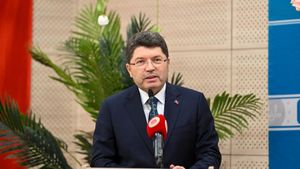Testosterone significantly worsens neutrophilia and cardiac injury following myocardial infarction, with marked differences between men and women.
The findings from recent research reveal potential connections between testosterone levels and post-myocardial infarction (MI) complications, particularly focusing on differences between male and female responses. The study highlights blood neutrophil counts, which were shown to be elevated following MI, particularly evidenced in male mice. Importantly, testosterone deficiency through castration aligns with lower neutrophil counts, leading to improved survival rates post-MI.
Animals subjected to testosterone deficiency developed smaller infarct sizes, indicating the hormone's detrimental role within the inflammatory response framework following MI. This was particularly noteworthy as the underlying mechanisms through which androgens exert these effects were linked to their influence on bone marrow stromal cells, which play pivotal roles in regulating neutrophil release within cardiac injury contexts.
The research underlines the need for re-evaluative perspectives on standard treatments administered during acute MI incidents, especially concerning current anti-inflammatory strategies and their effectiveness on different sexes. The authors of the article pointed out, "Our findings highlight the necessity of sex-specific approaches to efficiently treat myocardial infarction."
Analyzing additional data from the ASSAIL-MI trial, the research presented evidence showing significantly greater neutrophilia occurring post-MI among men compared to women, stressing the importance of personalized treatment modifications based on the disease physiology impacted by sex-specific variables. Enhanced neutrophil response following MI largely correlates with adverse cardiac outcomes like increased infarct size, heart failure, and mortality.
By investigating these connections, the authors unravel gender dimensions underpinning complications linked to MI through the perspective of testosterone and inflammation, which proved to showcase greater neutrophil counts and infarct sizes post-reperfusion on male subject models. Notably, castration induced testosterone deficiency correlated with reduced mortality and enhanced recovery outcomes, indicating a remarkable physiological shift due to altering hormonal environments.
The exploration of bone marrow activities unveiled testosterone's role via the androgen receptor within stromal cells, which were found to regulate the release of key inflammatory signals during acute MI. This important discovery led to conversations urging the consideration of these mechanisms when shaping future treatment paradigms for MI.
The findings also concluded potential interventional advantages associated with the administration of anti-inflammatory treatment strategies, such as IL-6 receptor blockade via tocilizumab, which was shown to effectively reduce neutrophil counts significantly. Interestingly, the drug presented greater effectiveness among male participants relative to females.
The overall implication of this research piece strongly encourages sex-specific therapeutic approaches when dealing with conditions like MI, where hormonal influences markedly skew the inflammatory responses, leading to varied patient outcomes. Results extracted from both animal and human data guide the practical applications of this work, exemplifying the necessity for holistic treatment philosophies within clinical settings.
While these remarkable findings establish insightful correlations between testosterone, neutrophilia, and cardiac injury, it stands to reason numerous factors influence MI outcomes. Future studies will continue to explore these realms, focusing on dissecting these existing mechanisms within larger population studies to yield definitive clinical pathways for pragmatism.
The unraveling of hormonal interplays, sex determinations, and personalized medicine principles are becoming increasingly relevant amid growing cardiovascular concerns—efforts of which will resonate significantly within therapeutic disciplines aimed at providing effective patient care on broader scales.
Conclusion reached, this research sensitively addresses the necessity for engendered platforms targeting cardiovascular therapy customizing approaches based on insights gleaned inherently from hormonal behavior guided dialogs.



